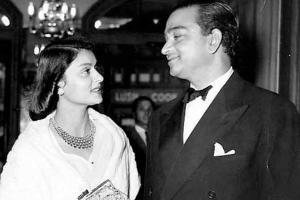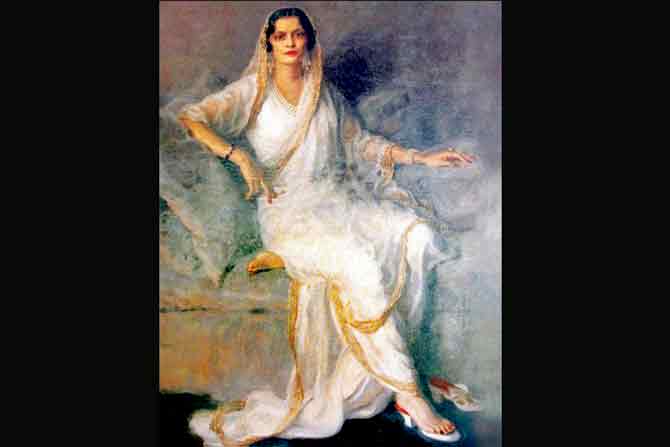
Gayatri Devi and Sawai Man Singh II of Jaipur, known to their friends as Ayesha and Jai. She was his third wife. Pic courtesy/ Wikimedia Commons, Juggernaut Books
It was in Ira Mukhoty's new magnum opus on Mughal emperor Akbar that this writer first read about the legacy of the Kachchwahas Rajputs, who trace their lineage to Kush, the son of Lord Ram, the mythical king of Ayodhya. They became a force to reckon with when the Kachchwaha ruler of Amber, Raja Bharmal, married one of his daughters, Harkha Bai, to the Mughal emperor Akbar. The alliance with the Mughals—a move that was more political than social—ensured "longevity of the clan and prosperity of the kingdom". That explains why, thereon, Mughal-Rajput unions became commonplace.
ADVERTISEMENT
The Kachchwahas are central to the narrative of Australia-based journalist and researcher John Zubrzycki's new book, The House of Jaipur (Juggernaut Books).

John Zubrzycki
Chronicling the story of the royal family of Jaipur, spanning the final decades of the British Raj to present day, Zubrzycki starts from the middle almost, with Mormukut Singh, born on August 21, 1911. He was the second son of Sawai Singh, the thakur of Isarda, who belonged to one of the six branches of the ruling Kachchwaha family of Jaipur. Mormukut would go on to become Sawai Man Singh II alias Jai, the next Maharaja of Jaipur, after being adopted by his uncle Maharaja Madho Singh II, who himself was adopted from Isarda by Ram Singh II in 1880. "His [Madho Singh II] decision not to have children with either of his wives derived from a prophecy that if one of them produced a son he would die within six months," Zubrzycki writes in the book. That Rajput history was replete with cases of "legitimate heirs being set aside, and illegitimate sons being adopted" didn't make Mormukut's adoption story out of the ordinary. But, it did set the foundation for a very complex and grand domestic saga, which was both, tragic as much as it was dramatic.
"I was a little intimidated by the breadth and depth of the subject," says Zubrzycki, whose previous book, The Last Nizam (2006) traced the history of the Nizams of Hyderabad. "But once I started delving into the history of Jaipur, and reading a little more about the lives of the royals, it captivated me," he adds, in a telephonic interview.
Zubrzycki admits that when it comes to the recent history of Jaipur, Sawai Man Singh II's third wife Maharani Gayatri Devi's memoir, A Princess Remembers, takes up a huge literary space. "Many people also think Devi's book to be the last word [on the royal family]. But there was so much that she had left out in the memoir. She was never going to admit her many travails, doubts and the challenging aspects of marrying into the family."

Portrait of Maharani Indira Devi of Cooch Behar (Gayatri Devi's mother) by Philip de László, c. 1928. Indira Devi is alleged to have had a brief affair with Sawai Man Singh II of Jaipur, before he became infatuated with her daughter. Pic courtesy/Wikimedia Commons
Gayatri Devi, known as Ayesha among friends and family, was a blue-blooded royal. Her mother Indira Devi, was daughter of Sayajirao Gaekwad, the Maharaja of Baroda, and wife of Jitendra, the Maharaja of Cooch Behar. It was, in fact, Indira Devi's scandalous yet fascinating life that first caught Zubrzycki's attention. Much before Jai became infatuated with Gayatri Devi, there were rumours of him having an affair with her mother. "It couldn't be proven and there was nothing I could find in the archives, but that [the liaison] was alluded to, by several writers, including Jai's biographer. I don't think Gayatri Devi would have necessarily been aware of it. But, the relationship between the two women was very complex. Even though Gayatri looked up to her mother, there wasn't a lot of closeness there. Indira was always off travelling around Europe, spending her time gambling, horse-riding, or taking lovers, and that left her with very little time for the children," says Zubrzycki. That Gayatri Devi's mother was an emancipated woman, who called off her marriage with the ruler of Gwalior, Madho Rao Scindia, in a letter, so that she could marry Jitendra, while her daughter accepted a role for herself as the third wife of the Maharaja of Jaipur in a Rajput conservative society, knowing fully that she'd have to go into purdah, shows that the two women led different lives.
Jai, the last of the ruling Maharaja of the princely state of Jaipur, before the state acceded to the Dominion of India, was the ultimate playboy prince, who led a double life, says Zubrzycki. In Europe, it was polo and women that kept him busy. "But when he was back in Jaipur, I think, he was a very different person, and that comes out in the book as well, particularly his relationship with his wives. He had two other wives, Marudhar Kanwar and Kishore Kumari [Jo Didi], who lived in purdah. He certainly didn't encourage either of them to break out of that at all."

Jagat, the only child of Gayatri Devi and Man Singh II. The prince, whose circle of friends included Imran Khan and Mick Jagger, died of alcoholism at 47. Pic couryesy/Melanie Palmer, Mr Priyanandana Rangsit
His lifestyle didn't win favour with the ruling British government. "They were frustrated with him, especially during the height of the Sikar crisis, in 1938 when there was a rebellion in Shekhawati. He would religiously travel to London in May, and not return until the monsoons were over. And he did that even when the rebellion was on and when he was most needed in the state. My own take was that he did a lot for Jaipur, of course. Particularly, during the time of the Partition, when he was made the Rajpramukh of the newly created state of Rajasthan. But, there is no doubt that had he not spent a good third of every year or almost half of every year abroad, indulging in his passions for polo, and partying with beautiful women, he could have done much more for his state. Perhaps, he could have embraced a political career like the other prices," says Zubrzycki.
A very important chapter in this biography is Gayatri Devi's political aspirations in post-Independent India, where many princes and princesses, who had accepted subservience to the British, were now forced to adjust to a new reality, with the abolition of privy pursues looming. Having lost Jai tragically during a polo match, Gayatri Devi now channelled all her energies into politics, winning election after election for the Swatantra Party.

US First Lady Jackie Kennedy with Gayatri Devi and Man Singh II at a polo exhibition match in Jaipur, 1962. Man Singh II died on the polo field in 1970, aged 57. Pic courtesy/Cecil Stoughton, Wikimedia Commons
It ended abruptly with Indira Gandhi, who Zubrzycki admits harboured a "deep-seated animosity" for Gayatri Devi since their schooling days at Shantiniketan, incarcerating her in Tihar Jail during the Emergency. She was arrested under the Conservation of Foreign Exchange and Prevention of Smuggling Activities [COFEPOSA] Act—"the evidence against her being the loose change in pound notes and various coins" found at her home, Moti Doongri. That event did make Gayatri Devi take a step back from politics, but Zubrzycki would not like to see it as a life-changing experience. "She didn't really pause, even though she got out of politics. She continued enjoying her polo, playing society hostess, and remained socially active with her schools and her causes."
And, while Gayatri Devi does overshadow the Jaipur biography, precisely because of her charisma, and her political and social influence, both in Jaipur and outside, Zubrzycki does take us through the lives of Jai's first wives, who were otherwise, mostly reduced to oblivion. By the 1980s, their children, Bhawani Singh (from Marudhar), and Jai Singh and Prithviraj Singh (from Kishore) along with Gayatri's late son Jagat, got caught in an unending and ugly family feud over power and wealth, that continues to be a hotbed.
But, with Bhawani Singh's MP daughter Diya Kumari's stellar rise in politics, and her son Padmanabh 'Pacho' Singh becoming the poster boy of the Jaipur royals, things are finally looking up, feels Zubrzycki. "I think there are signs that the legacy is heading in the right direction. They have to come to some sort of compromise over the various legal cases they have been fighting, in some cases for more than 30 years. All of them seem to be going nowhere. It is the lawyers who are making money out of this. It's corrosive, divisive, and tarnishes their reputation, which is unfair because when you look at the family now, I see a lot of hope. I think the younger generation, including Padmanabh Singh, would prefer to look forward rather than backward. Other royal families have, and there's really nothing stopping the Jaipur family from doing the same."
Catch up on all the latest Mumbai news, crime news, current affairs, and a complete guide from food to things to do and events across Mumbai. Also download the new mid-day Android and iOS apps to get latest updates.
Mid-Day is now on Telegram. Click here to join our channel (@middayinfomedialtd) and stay updated with the latest news
 Subscribe today by clicking the link and stay updated with the latest news!" Click here!
Subscribe today by clicking the link and stay updated with the latest news!" Click here!






